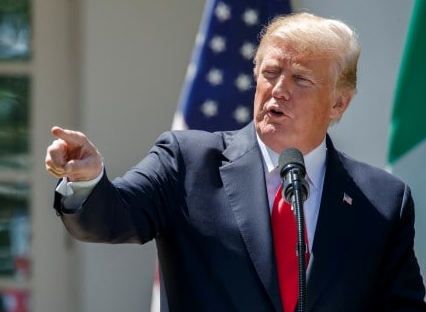 America’s farmers are about to start harvesting the wheat crop. Close to 60m tonnes are gathered annually and almost half is usually exported. Where this crop will be sold, though, remains an open question.
America’s farmers are about to start harvesting the wheat crop. Close to 60m tonnes are gathered annually and almost half is usually exported. Where this crop will be sold, though, remains an open question.
As Donald Trump’s trade war escalates, a lot of farmers are worried. Trump was elected, in part, on a promise to put America’s interests first and crack down on what he characterises as a world trade system rigged against the US. But until recently the president has acted like many of his predecessors – talking tough on the campaign trail but backtracking in the White House.
All that has changed. Week after week, Trump’s trade talk has seemed to harden. "One of the most concerning things is how this is escalating," said David Salmonsen, the senior director for congressional relations at the American Farm Bureau Federation, one of US agriculture’s most powerful lobby groups.
As the harvesting season begins, China, Mexico, Canada and the EU are all threatening retaliation over Trump’s tariffs on steel and aluminium. Agriculture is in the firing line. Farmers are often the first to feel the hit in trade disputes that may not involve their own products, said Salmonsen. This time, the scale of the dispute could hardly be worse: US agricultural exports are worth about $140bn a year. Canada and Mexico import about $39bn worth, China’s share is $20bn and the EU around $12bn. All those countries have threatened retaliation over metal tariffs.
The dispute looks set to escalate. On or around 15 June, Trump will publish a list of $50bn worth of Chinese technology products to be hit with a 25% tariff. China is expected to hit back with a list of its own and US farmers expect they will be top of that list.
The problem is that no one, perhaps not even Trump, seems to know what will happen next. Days after the US treasury secretary, Steven Mnuchin, said a trade war with China was "on hold", the senior trade adviser Peter Navarro dismissed that comment as an "unfortunate soundbite".
Many are hoping that the war of words will prove no more than that. While the president’s policy continues to sway like corn on a Iowa prairie, America’s farmers preparing for harvest are getting nervous. "A lot of the talk so far has been about what might happen," said Salmonsen. Now that matters are coming to a head: "June looks critical."
Based on farminguk.com and theguardian.com.

